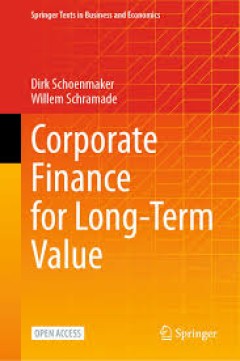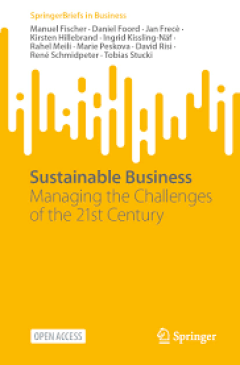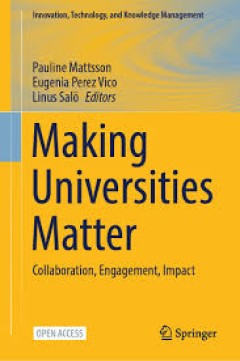Filter by

Model-Based Demography : Essays On integrating Data, Technique and Theory
Late in a career of more than sixty years, Thomas Burch, an internationally known social demographer, undertook a wide-ranging methodological critique of demography. This open access volume contains a selection of resulting papers, some previously unpublished, some published but not readily accessible. Rejecting the idea that demography is simply a branch of applied statistics, his work views i…
- Edition
- -
- ISBN/ISSN
- 9783319654324
- Collation
- XVIII, 200
- Series Title
- -
- Call Number
- 650

Methodological investigations in Agent-Based Modelling : With Applications Fo…
Agent-Based Modelling; ABM; Artificial Intelligence; AI; Computational social science; Social simulation; Population sciences
- Edition
- -
- ISBN/ISSN
- 9783658172756
- Collation
- XXIII, 235
- Series Title
- -
- Call Number
- 650

Corporate Finance for Long-Term Value
This open access textbook offers a guide to corporate finance for modern companies that want to create long-term value. Drawing on recent literature on sustainable companies, it starts by analysing the Sustainable Development Goals as a strategy for the transition to a sustainable economy. Next, it translates the general concept of sustainability into core corporate finance methods, such as net…
- Edition
- -
- ISBN/ISSN
- 978-3-031-35009-2
- Collation
- XXXIX, 630
- Series Title
- Springer Texts in Business and Economics (STBE)
- Call Number
- 650 WES m

Sustainable Business : Managing the Challenges of the 21st Century
This open access book is a compact guide to the development of sustainable business, which has become the central concept in discussions about the future development of humanity and planet earth. It provides basic terminology and concepts on sustainable business and offers insights into a new management paradigm that integrates social and environmental dimensions into business models, strategie…
- Edition
- -
- ISBN/ISSN
- 978-3-031-25397-3
- Collation
- XVIII, 142
- Series Title
- SpringerBriefs in Business (BRIEFSBUSINESS)
- Call Number
- 650 FIS s

R&D Management Practices and Innovation: Evidence from a Firm Survey
This Open Access book provides a detailed account of firms’ research and development (R&D) management practices, and whether and how R&D management practices are associated with the success and the nature (explorative or exploitive) of innovation, using a unique survey of firms in Japan. While there is wide agreement that innovation is a key determinant for growth of firms, there are few stud…
- Edition
- 1
- ISBN/ISSN
- 978-981-16-9797-5
- Collation
- IX, 99
- Series Title
- SpringerBriefs in Economics
- Call Number
- 650 HAN r

Local Tax Benefits at a Distance : Japan's Hometown Tax Donation Payment
This book discusses the concepts, types, models, and patterns of Japan’s Hometown Tax Donation Payment system, to provide a clear picture of this newly developed unique and innovative fund-raising tool used by municipalities. It also sheds light on the influences that reciprocal gifts provided by each municipality to donors have on local economies by reviewing empirical works and surveys targ…
- Edition
- -
- ISBN/ISSN
- 978-981-16-5138-0
- Collation
- XV, 100
- Series Title
- SpringerBriefs in Economics (BRIEFSECONOMICS)
- Call Number
- 650 HOD l

Making Universities Matter : Collaboration, Engagement, Impact
In an era of rapid change and increasing societal demands, the role of universities as knowledge producers and catalysts for change has come under scrutiny. This open access book offers a fresh perspective on the significance of universities in society, shedding light on how their knowledge can truly matter beyond academia. Drawing upon insightful inquiries from both the Swedish and internat…
- Edition
- -
- ISBN/ISSN
- 9783031487996
- Collation
- V, 232
- Series Title
- Innovation, Technology, and Knowledge Management (ITKM)
- Call Number
- 370 MAK

The Virtues of Green Marketing
This open access book explores the idea that corporate rhetoric can be a force for good. In developing a new framework for analysis and discussion of green marketing, the authors argue that corporate environmental rhetoric can be harnessed to contribute to climate transition and a more sustainable market economy. The work explores the transformative power inherent in green promises and sets a v…
- Edition
- 1
- ISBN/ISSN
- 978-3-031-32979-1
- Collation
- oer.unej.ac.id
- Series Title
- Rhetoric, Politics and Society
- Call Number
- 650

Human Privacy in Virtual and Physical Worlds
This open-access book is premised on the belief that understanding and protecting privacy requires a multidisciplinary approach. The editors of this contributed book believe that privacy is a ‘wicked problem’ because of its social complexity. In the modern world, political, social, and technological structures increasingly violate human privacy in physical and virtual spaces. Our behaviors …
- Edition
- 1
- ISBN/ISSN
- 978-3-031-51063-2
- Collation
- oer.unej.ac.id
- Series Title
- Technology, Work and Globalization
- Call Number
- 650

Drones and the Creative Industry :Innovative Strategies for European SMEs
This open access, interdisciplinary book presents innovative strategies in the use of civil drones in the cultural and creative industry. Specially aimed at small and medium-sized enterprises (SMEs), the book offers valuable insights from the fields of marketing, engineering, arts and management. With contributions from experts representing varied interests throughout the creative industry, inc…
- Edition
- 1
- ISBN/ISSN
- 9783319952611
- Collation
- X, 161 hlm,: ill, lamp;
- Series Title
- -
- Call Number
- -
 Computer Science, Information & General Works
Computer Science, Information & General Works  Philosophy & Psychology
Philosophy & Psychology  Religion
Religion  Social Sciences
Social Sciences  Language
Language  Pure Science
Pure Science  Applied Sciences
Applied Sciences  Art & Recreation
Art & Recreation  Literature
Literature  History & Geography
History & Geography